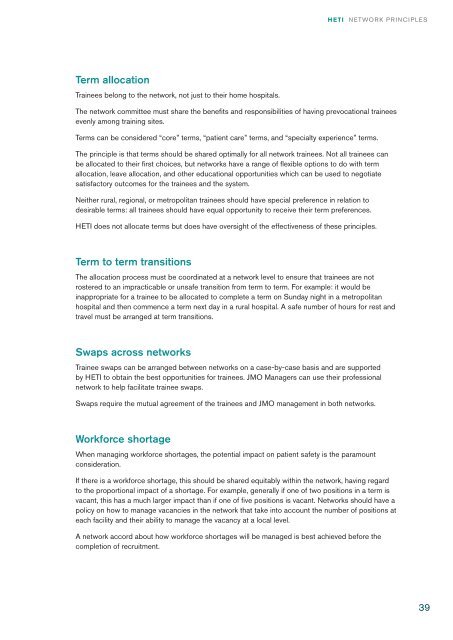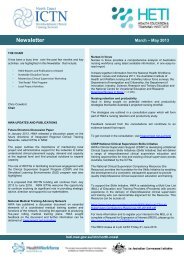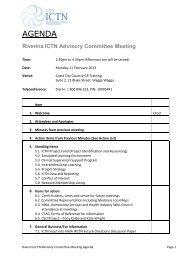Network principles for prevocational medical training - HETI
Network principles for prevocational medical training - HETI
Network principles for prevocational medical training - HETI
You also want an ePaper? Increase the reach of your titles
YUMPU automatically turns print PDFs into web optimized ePapers that Google loves.
<strong>HETI</strong> NETWORK PRINCIPLES<br />
Term allocation<br />
Trainees belong to the network, not just to their home hospitals.<br />
The network committee must share the benefits and responsibilities of having <strong>prevocational</strong> trainees<br />
evenly among <strong>training</strong> sites.<br />
Terms can be considered “core” terms, “patient care” terms, and “specialty experience” terms.<br />
The principle is that terms should be shared optimally <strong>for</strong> all network trainees. Not all trainees can<br />
be allocated to their first choices, but networks have a range of flexible options to do with term<br />
allocation, leave allocation, and other educational opportunities which can be used to negotiate<br />
satisfactory outcomes <strong>for</strong> the trainees and the system.<br />
Neither rural, regional, or metropolitan trainees should have special preference in relation to<br />
desirable terms: all trainees should have equal opportunity to receive their term preferences.<br />
<strong>HETI</strong> does not allocate terms but does have oversight of the effectiveness of these <strong>principles</strong>.<br />
Term to term transitions<br />
The allocation process must be coordinated at a network level to ensure that trainees are not<br />
rostered to an impracticable or unsafe transition from term to term. For example: it would be<br />
inappropriate <strong>for</strong> a trainee to be allocated to complete a term on Sunday night in a metropolitan<br />
hospital and then commence a term next day in a rural hospital. A safe number of hours <strong>for</strong> rest and<br />
travel must be arranged at term transitions.<br />
Swaps across networks<br />
Trainee swaps can be arranged between networks on a case-by-case basis and are supported<br />
by <strong>HETI</strong> to obtain the best opportunities <strong>for</strong> trainees. JMO Managers can use their professional<br />
network to help facilitate trainee swaps.<br />
Swaps require the mutual agreement of the trainees and JMO management in both networks.<br />
Work<strong>for</strong>ce shortage<br />
When managing work<strong>for</strong>ce shortages, the potential impact on patient safety is the paramount<br />
consideration.<br />
If there is a work<strong>for</strong>ce shortage, this should be shared equitably within the network, having regard<br />
to the proportional impact of a shortage. For example, generally if one of two positions in a term is<br />
vacant, this has a much larger impact than if one of five positions is vacant. <strong>Network</strong>s should have a<br />
policy on how to manage vacancies in the network that take into account the number of positions at<br />
each facility and their ability to manage the vacancy at a local level.<br />
A network accord about how work<strong>for</strong>ce shortages will be managed is best achieved be<strong>for</strong>e the<br />
completion of recruitment.<br />
39

















